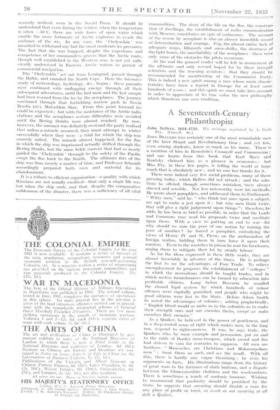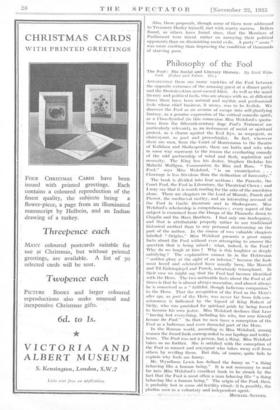A Seventeenth-Century Philanthropist
John Defiers, 1654-1725. His writings reprinted by A. Rah' Fry. (Casson. 6s.)
Joins Bra.ixas was certainly one of the most. remarkable men of the later Stuart and Revolutionary time ; and yet feit, even among students, know so much as his name. There is a mention of him in Bernstein's Cromwell and Communism ; and one learns from this book • that Karl Marx and Kautsky claimed him as a pioneer- in economies : but Miss Fry, in these ; few pages, is telling the world at large much that is absolutely new ; and we owe her thanks for it.
There were indeed very few social problems, many of theM pressing today, which Balers did not attack ; and the solu- tions he offered, though sometimes mistaken, •11. 'ere always shrewd and sensible. Nor less noteworthy were his methods, He wrote short pamphlets, and addressed them: to Parlitunent,' " Witty men," said he, " who think but once upon a subject, are apt to make a jest upon it : but wise men think twice, , that will give a right judgement upon things"; therefore,- he adds, he has been as brief as possible, in order that the Lords and Commons may 'read his proposals -twice and meditiffe upon them. With a view to putting an end to war-4)r why should we ruin the poor of one nation by ruining the poor of another ?-1-lie forced a pamphlet, embodying the views of Henry IV and St. Pierre, on the ambassadors 'Of foreign realms, bidding them in turn force it upon their masters. Even to the wretches in priSon he sent his brochures, urging them to mitigate their lot by steady labour.
As for the ideas expressed in these little works, they are almost invariably in advance of the times. He is perhaps. the first to see the advantages of Free Trade. To relieve unemployment he proposes the establishment of " colleges in which the necessitous should be taught trades, and in which useless incumbrances can be turned by education into profitable citizens. Long before Bceeuria he assailed the absurd legal system by which hundreds of minor offences were capitally punished, and people who might be good citizens were lost to the State. Before Adam Smith lie noted the advantages of colonies ; adding prophetically, " English blood- would so unite us to the colonists as to make their strength ours and our enemies theirs, except zve make ourselves their enemies."
As a Quaker, he believed in the power of gentleness, and in a cheep-rooted sense of right Which makes men, in the long . run, respond to 'righteousness. It was, he says truly, the Quakers who, by there example and persuasion, put an end to the raids of Border moss-troopers, which sword and fire had striven in vain for centuries to suppress. All men are brothers—" Muscovites are Christians and Mohammedans. men " : treat theM as such, and see the result. With all this, there is hardly any vague theorising : he rests his arguments on facts. His illustrations range from the history of great wars to the fortunes of cloth buttons, and a dispute' between the Gloucestershire clothiers and the Woolcombers. There is sometimes a touch of sardonic humour. Wishing to recommend that profanity should be punished by the St-ate, he suggests that swearing should disable a man for any place of profit-or trust; as much as not swearing .(d, ull (loth ti quaker.
Alas, these proposals, though some of them were addressed to Treasurer Harley himself, meet with scanty success. Betiers found, as others have found since, that the Members of Parliament were intent rather on annoying their political opponents than on diminishing social evils. A party " score " was more exciting than improving the condition of thousands of starving poor.































































































 Previous page
Previous page